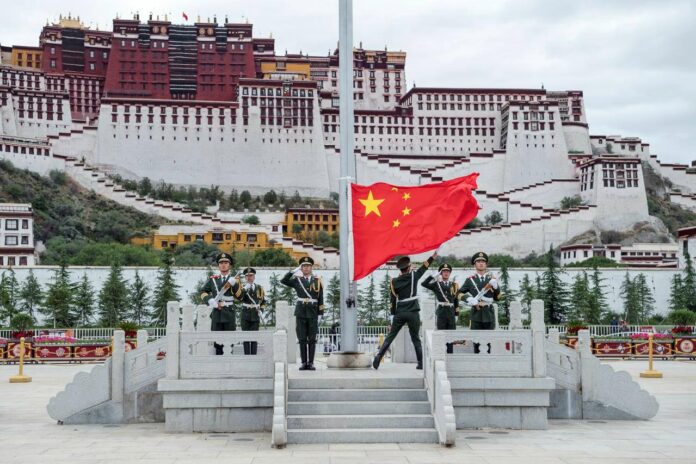(TibetanReview.net, Aug15’21) – Although most of the celebration events are over, highlighted by a visit by President Xi Jinping over Jul 21-23, China continues to be in celebrations mood to mark the 70th anniversary of its annexation of Tibet. Its official Xinhua news agency announced Aug 14 that a set of commemorative coins will be issued on Aug 16 to mark what it called China’s peaceful liberation of Tibet.
The set will contain one gold coin and one silver coin, both legal tenders, the report said, citing a statement from the People’s Bank of China.
Both coins feature the PRC’s national emblem, name and year of issuance on the obverse, while the reverse is inscribed with combinations of different pictures, denominations, “1951-2021,” and a line that reads “the 70th anniversary of the peaceful liberation of Tibet” in both Chinese and Tibetan languages, the report said.
The gold coin, which is 22 mm in diameter, contains eight grams of pure gold and has a face value of 100 yuan (about 15.43 US dollars).
The reverse side of the coin features a combination of images — sunflower, pomegranate, snow lotus and hada (a traditional Tibetan silk scarf that symbolizes purity and auspiciousness), as well as the number “70,” the report said
The silver coin, which is 40 mm in diameter, contains 30 grams of pure silver and has a face value of 10 yuan.
The reverse side of the coin features the images of highway, railway, bullet train, plane, folk house, snow mountain, lake, galsang flower and ribbon.
The report said a maximum of 10,000 gold and 20,000 silver coins will be issued.
The anniversary marks the signing in China on May 23, 1951 of what China calls the Agreement of the Central People’s Government and the Local Government of Tibet on Measures for the Peaceful Liberation of Tibet (17-Article Agreement). The report added that the signing of the agreement officially proclaimed the peaceful liberation of Tibet.
However, Tibetans contend that their delegation had no mandate to sign that agreement; that the signing took place under duress with threats of overwhelming use of force; that China itself never adhered to the terms of that agreement; and, in any case, the Dalai Lama, Tibet’s temporal head and spiritual leader, repudiated it when he had the first opportunity do so after arriving in India in 1959.






